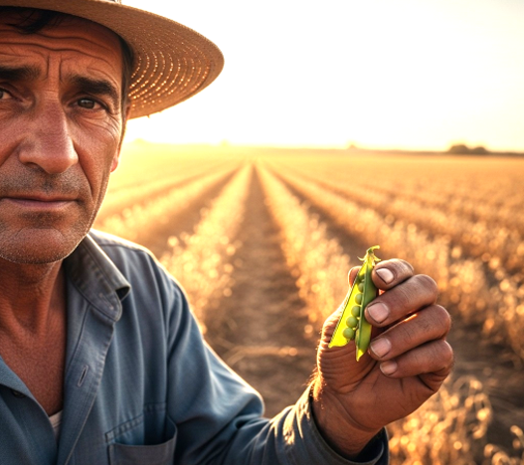Alpha Portfolio Service Brochure
Taking the Pea?

Putin’s invasion of Ukraine created political and economic challenges together with a humanitarian disaster. The ensuing energy crisis was a key driver of the UK’s cost-of-living crisis, as higher costs, notably energy costs, fed into sharply higher food prices.
However, climate change is now adding to the cost-of-living crisis. UK grocery prices increased by 5.2% in the four-weeks to mid-July. The British Retail Consortium is forecasting food inflation will hit 6% by the end of this year due to the Budget increasing employer National Insurance and the National Living Wage.
Almost half of the food consumed in the UK is imported from overseas from countries such as France, Spain and Brazil. Food prices worldwide have been affected by poor harvests, while UK farmers have been hit by extreme weather conditions. The UK suffered its driest spring in more than a century.
Some of the UK’s largest food retailers have warned that hot, dry weather and lower fruit and vegetable harvest yields are adding to food inflation.
The dry weather resulted in the 2025 harvest season beginning weeks earlier than usual in many parts of the UK. In addition, high temperatures and minimal rainfall has stressed crops during critical growth stages, affecting grain protein content and straw yield. As a result, quality and yields are expected to vary across the country. A shortage of British-grown peas has also been flagged by growers. The weather has resulted in the earliest harvest in 14 years and a 30% drop in the number of peas picked and processed.
Globally, the price of chocolate has been pushed up by poor harvests due to extreme temperatures in west Africa. Meanwhile, coffee prices have been pushed higher as adverse weather hit production in Brazil and Vietnam.
Think-tank, The Autonomy Institute has warned that due to climate change, that in a ‘worse-case scenario,’ food prices could rise by more than a third by 2050. Even under a ‘best-case scenario’ it forecasts food prices could still rise by a quarter!
While the Bank of England is focusing its attention upon wage inflation, clearly higher grocery prices are not helpful. Higher food prices will also continue to be a problem for UK politicians. Food inflation is likely to disproportionately hit lower-income households, because they spend a larger share of their monthly budget on essential items, such as bread, rice and meat. The think-tank warns that almost 1 million people could be pushed into poverty by higher food prices.
With no sign of climate change abating, the UK cost-of-living crisis is not disappearing anytime soon.
What have we been watching?
Trump’s 1st August trade tariff deadline and upheaval in the US after major revisions to jobs data!
Just hours before the 1st August deadline, Trump signed an executive order outlining a new set of tariffs, including a 10% global minimum and duties of 15% or higher for countries with trade surpluses with the US. These will come into force on 7th August. If goods are transhipped through another country to get lower tariffs they will be supplemented at 40%. Amongst the standout tariffs, are those against Canada at 35% but with some goods exceptions, South Africa at 30%, Switzerland 39%, Taiwan 20%. Thailand at 19% and Vietnam at 20%. There is an extended deal for China as trade negotiations continue. Mexico will continue to pay a 25% tariff but has been granted a 90-day extension for further trade talks. Meanwhile, according to media reports, the US Court of Appeals began hearing arguments last week regarding Trump’s use of tariffs, with a ruling expected ‘within weeks.’
The IMF raised its global economic growth forecasts in part due to some US tariffs on goods being softened. It is forecasting 3% growth in 2025 and 3.1% in 2026, up from 2.8% and 3% in its April report. However, this growth rate remains below its 3.3% forecast at the stat of the year and the pre-pandemic historical average of 3.7%. The UK economic growth forecasts are unchanged at 1.2% in 2025 and 1.4% in 2026.
In the US, the Federal Reserve (Fed) left interest rates unchanged as expected but two members of the committee dissented for a 0.25% cut including Christopher Waller who is after the Fed Chair job! The Fed said that the effects of higher tariffs on goods prices are starting to be seen but that it is unclear whether this is a one-off impact or likely to drive ongoing inflation. US core PCE inflation came in a little ahead of expectations, so picking up as Powell said it would, but slowly as tariffs are only just really being implemented.
![]()
Meanwhile, US economic growth in the second quarter of 2025 was better than expected at 3%. However, US July non-farm payrolls were weaker than expected and there were huge revisions to the previous two month’ s jobs data of minus 258,000! The probability of a US interest rate cut at the Fed’s next meeting in mid-September jumped from 40% to 87% following the jobs data.
Then, Trump dismissed the head of the Bureau of Labour Statistics, accusing her of political bias following the dramatic revisions to the US jobs data. There was further upheaval as at the end of last week, Fed governor Adriana Kugler resigned. This has created an opportunity for Tump to appoint a new Fed board member. This individual could potentially be groomed as a successor to Jerome Powell , or at the very least , represent another in favour of interest rate cuts.
![]()
Brent oil was broadly unchanged at $68 following Trump’s latest tariff actions.
Finally, talking of farming. HMRC has handed an ‘Expert of the Year’ award to one of its civil servants for his work on cancelling agricultural reliefs for farms as well as levying the death duty on pensions. Just don’t tell Jeremy Clarkson!
Full version
© Alpha Portfolio Management 2025. All Rights Reserved
Site by Lookhappy

